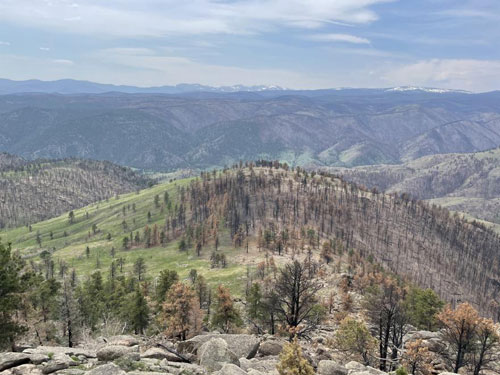The overarching goal of this project was to characterize SES resilience by measuring value-explicit perceptions of resilience before and after wildfire events in the Poudre River Watershed.
Objectives:
- Develop a set of SES indicators that are meaningful and context-specific to wildfire-watershed systems in the IMW.
- Measure value-explicit perceptions of resilience of SES in the Poudre Exemplar, including how management actions influence resilience.
- Compare perceptions of resilience of SES to value-free indicators of ecological and social resilience in the Poudre Exemplar.
- Discuss with stakeholders the utility of these different resilience indicators and how they can be used for guided transformation.

Photo Credit: USDA Forest Service
Charter Summary:
This research focuses on understanding the perceptions stakeholders hold about social-ecological system (SES) resilience. Using a SES framework, we developed a contextualized set of resilience indicators and will characterize resilience through stakeholder interviews and surveys in fire-prone watersheds across the Intermountain West (IMW). To date we have conducted interviews and surveys with stakeholders in two-fire prone watersheds in Northern Colorado – the Poudre River and Big Thompson River Watersheds. Through stakeholder perceptions, we assessed current and wildfire-driven changes to resilience as well as recommended pre- and post-wildfire management actions and priorities for improving future resilience. Except for watershed processes variability, large scale wildfires did not significantly influence perceived resilience of most ecological indicators in these two watersheds. Wildfire events, however, had strong negative influence on perceived resilience of ecosystem service indicators but were perceived to catalyze benefits in social dimensions of resilience in these two watersheds. In terms of management actions and future resilience, stakeholders underscored a need for increased pace, scale, and connectivity of fuel treatments with particular interest in prescribed fire. While current stakeholder connectivity was high, continued prioritization of partnerships remains a focus for future resilience. Work concluded on this project in May 2023.
Primary Contact
- Kelly Jones (NMSU)
Team Members
- Ryan Morrison (CSU)
- Camille Stevens-Rumann (CSU)
- Alex Webster (UNM)
Students
- Alyson Cheney (CSU), M.S., 2021-2023
Community Partners
Publications
- Cheney, A., Jones, K.W., Stevens-Rumann, C.S., Salerno, J. “Perceived changes in social-ecological resilience in fire-prone ecosystems in Colorado.” Ecology and Society. 2024. https://doi.org/10.5751/ES-15436-290405
- Cheney, A. 2023. Measuring social-ecological resilience in fire prone systems of northern Colorado [M.S. thesis, Colorado State University]. Mountain Scholar. https://hdl.handle.net/10217/236569